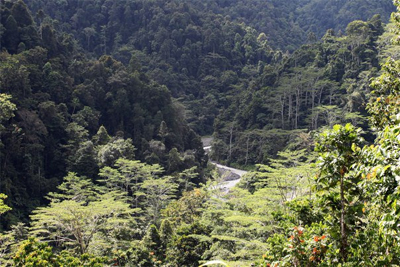Wandojo Siswanto, one of the lead negotiators for Indonesia’s climate delegation in Copenhagen and a key architect of its Reduced Emissions from Deforestation and Degradation (REDD) program, has been named as a corruption suspect by the country’s anti-corruption agency, KPK, reports Reuters.
Siswanto is accused of receiving a bribe of about $10,000 from Anggoro Widjojo, a director of PT Masaro Radiokom, to win favorable treatment in the forest ministry’s budget for the telecommunications company. Siswanto has been named in at least two other corruption probes, including a 2008 case where he admitted to taking a Rp 50 million ($4,600) kickback from lawmaker Al-Amien Nasution.
Siswanto maintains he is innocent in the Masaro Radiokom case, telling Reuters that while he received the money, he turned it over to the KPK after holding it for four months.
“It was just put on my table. I was not brave enough to make a report to the KPK at that time,” he told Reuters. “I never asked for that kind of money… The money didn’t make me do something.”
 Rainforest in Indonesia’s West Papua province, on the island of New Guinea. |
Nevertheless, the charge raises troubling questions about the capacity of Indonesia’s forestry ministry to manage potentially billions of dollars of payments under the proposed REDD program, which aims to reduce Indonesia’s greenhouse gas emissions by shifting its development model away from one that consumes forests to one that protects forests. Several governments—including Norway, which has already committed up to a billion dollars—are supporting the initiative.
“This revelation should raise serious questions about the due diligence by Norway, the World Bank, USAID and governments negotiating the REDD deal with Indonesia,” one insider, who asked to remain anonymous because he doesn’t have the authority to speak on the record, told mongabay.com via email. “Siswanto has an established record of corruption—this isn’t a first time offense. Why is he still Indonesia’s negotiator? What hasn’t anything been done with this information.”
Concerns over the fate of Indonesia’s REDD funds have been raised before. Critics cite the country’s reforestation fund, which lost $5.25 billion between 1994 and 1998, according to Ernst and Young audit. The fund was managed by the forestry department.
Chandra M. Hamzah, deputy chairman at the KPK, told Reuters that the forestry sector is “a source of unlimited corruption.”
Norway’s International Climate and Forest Initiative, the department under which the Indonesia-Norway partnership on REDD+ was negotiated, expressed concern in a response to the new report.
“It is an unfortunate fact that there are significant governance challenges, including issues of fiduciary management, in most tropical forest countries,” read a statement emailed to Reuters. “Clearly, dealing with these challenges is a priority.”
CITATION: Sunanda Creagh. Graft could jeopardise Indonesia’s climate deals. Reuters. Sep 17, 2010
Related articles